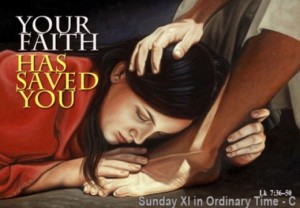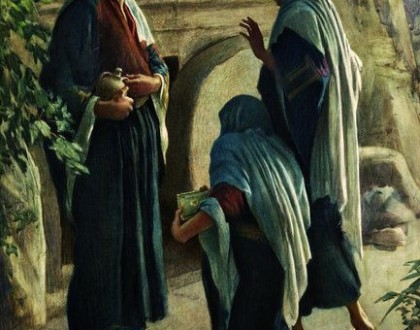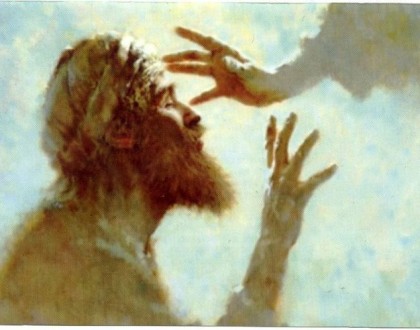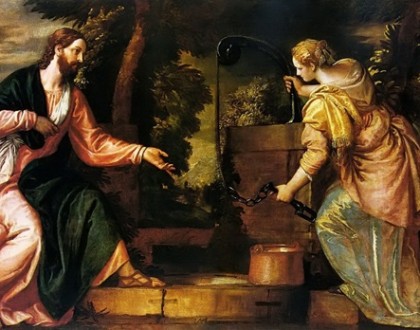Eleventh Sunday in Ordinary Time, Year B – June 14, 2015

Eleventh Sunday in Ordinary Time, Year B – June 14, 2015
The growth of plants, trees, flowers and grass, takes place very quietly and slowly, without our knowing. This growth permeates three of the four readings for this Sunday (Ezekiel 17:22-24, Psalm 92, Mark 4:26-34).
Today’s first reading from Ezekiel (17:22-24) is part of a lengthy allegory that combines fables from nature with concrete historical judgments, thus enabling the prophet to include the promise of future restoration in the historical framework of Judah’s own experience. In the midst of Israel’s great exile, Ezekiel knows that God does the unexpected – bringing low the high tree and making high the low. The great cedar represents the king of Judah, and the other trees are the kings of the surrounding nations. God will plant on Mount Zion in Jerusalem a young, tender sprig from the top of the same cedar. This is referring to the final king or messiah who will rise up from the house of David. This king will be enthroned in Jerusalem, atop the highest mountain of Israel (2 Samuel 7:13). Many other nations will come and find refuge under this new kingdom.
The God of Israel always does the unexpected – bringing low the high tree and making high the low. God makes desert areas bloom and makes what may be superficially blooming wither (Ezekiel 17:24). God restores broken hearts and decimated hopes. Though the prophet Ezekiel’s words referred at first to the hopes of ancient Israel, they still resound in our midst today. Even though the worldly dynasty of David would disappear, David’s hopes would be fulfilled in a way far more glorious than he ever imagined!
The prophet Ezekiel’s words stir our hearts and minds, and remind us of God’s constant fidelity, especially when growth seems delayed or even impossible: “I the Lord have spoken, and I will do it” (17:24).
The just shall grow as tall as palms…
Psalm 92 is a psalm of praise extolling God’s providence. Two dominant images of this psalm are the cedar tree and the date palm. These are two very contrasting trees. While the date palm can bear fruit, it lacks the lasting strength and stamina of the cedar. The cedar is mighty, but it cannot bear fruit. In biblical lands, the palm tree and the towering cedar of Lebanon suggest strength, justice, righteousness and beauty. Both the date palm and the cedar are planted deliberately in the house of the Lord. It is there, in the Sanctuary of God’s Law, that they have their roots; it is from there that they derive all their vigour and strength. Both trees are presented as models for those who wish to live lives of righteousness and justice, planted firmly in God’s presence.
Our homeland is the Lord
St. Paul builds on the theme of Ezekiel’s prophecy as he speaks about the mystery of our union with Christ’s death and resurrection (2 Cor 5:6-10). Paul faces the fear of his own death and admits his difficulty at wanting to be “at home in the body/away from the Lord” or “away from the body/at home with the Lord”. His confidence flows from his faith. In this life, we are separated from Christ. For this reason Paul would prefer death, “to be away from the body and at home with the Lord.” At present we are citizens in exile, far away from our home. The Lord is the distant homeland, believed in but unseen (7). Paul affirms his confidence by contrasting what is of permanent value with what is only passing. Paul drives home the point that the sufferings of the present are not a valid criterion of apostleship because the true home of all believers is elsewhere.
So too with us – God is mysteriously drawing us towards our heavenly homeland. From this earthly home we prepare for our heavenly home; heaven is constantly calls us forward, instilling within us a deep longing to be with the Lord while we are still in the flesh here below.
Paul’s message speaks to us today: it is only from this earthly home that we will learn and prepare for the heavenly home; the way that we live our lives here and now with the Lord will be a very good indication of how we will spend our eternity with Him.
The assurance of the harvest
In today’s well-known Gospel story of the sower, Jesus announces the fulfillment of Ezekiel’s hopes, though with a kingdom even more unexpected than Ezekiel could ever imagine. This new kingdom would not be rooted in a geographical or political reality, but rather in human hearts. In today’s parable of the sower, Mark (4:26-34) links two of Jesus’ parables, featuring the image of a growing seed to speak of the kingdom of God. In the parable of the seed growing of itself (26-29), Mark contrasts the relative inactivity of the farmer with the assurance of the harvest. The sower need only do only one thing: wait for the crop to mature and then reap the harvest.
Only Mark records the parable of the seed’s growth (26-29). Sower and harvester are the same. The emphasis is on the power of the seed to grow of itself without human intervention (27). Mysteriously it produces blade and ear and full grain (28). Thus the kingdom of God initiated by Jesus in proclaiming the word develops quietly yet powerfully until it is fully established by him at the final judgment (29).
The mustard seed
The second parable is better known. Jesus uses the mustard seed to show the beginnings of the kingdom, exaggerating both the smallness of the mustard seed and the size of the mustard plant. The mustard seed is really not the smallest seed and the plant is only bush, not a tall tree. Jesus used this image to show that the kingdom will grow and flourish even though its beginnings seem very small and insignificant. The seed in Jesus’ hand is tiny, simple and unimpressive. Yet the Kingdom of God is like that.
From these small seeds will arise the great success of the Kingdom of God and of God’s Word. Since the harvest symbolizes the last judgment, it is likely that the parable also addresses the burning issue of slow progress in the growth of God’s kingdom, especially when that growth was hindered by persecution, failure or sinfulness. Patience is called for in the face of humble beginnings. Jesus reassures the crowd that growth will come; it is only at the harvest that the farmer reappears. The growth of God’s kingdom is the result of God’s power, not ours. Like the tiny mustard seed, the kingdom of God is something that grows from a tiny beginning.
The Lord uses the vivid image of the mustard seed to speak about our faith. When we have faith, the Lord will accomplish great things in us. Whenever and wherever we take ourselves and our efforts too seriously, seeking by our plans and programs to “bring forth the kingdom of God,” we will go away frustrated and sad. We must never forget that it is the Lord who sows, the Lord who waters, the Lord who reaps the harvest. We are merely servants in the vineyard. Let us beg the Lord to bless the desires he has planted deep in our hearts. As the mustard seed grows into a tree of shelter for birds, may our families and faith communities be signs of the Kingdom every person our communities is protected, respected and loved.
Recent Sermons

Easter Sunday – The Resurrection
April 14, 2017

4th Sunday of Lent Year A – The Man Born Blind
March 27, 2017

3rd Sunday of Lent Year A – The Samaritan Woman at the Well
March 20, 2017




